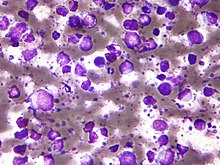User:Mr. Ibrahem/B-cell lymphoma
| B-cell lymphoma | |
|---|---|
 | |
| Micrograph showing a large B cell lymphoma. Field stain. | |
| Specialty | Hematology, oncology |
| Symptoms | Swollen lymph nodes, abdominal pain, tiredness, fever, night sweats, weight loss[1] |
| Types | Indolent, aggressive[2] |
| Risk factors | Genetics, environmental factors, viral infections, connective tissue disorders, poor immune function[1] |
| Diagnostic method | Tissue biopsy[2] |
| Treatment | Radiation therapy, chemotherapy, immunotherapy, stem cell transplant[2] |
| Frequency | 19 per 100,000 per year (the West)[3] |
B-cell lymphoma are types of lymphoma affecting B cells, a type of white blood cell that makes antibodies.[1][3] Symptoms may include swollen lymph nodes, abdominal pain, tiredness, fever, night sweats, or weight loss.[1] They generally start within lymph nodes, the spleen, bone marrow, or blood.[4]
Risk factors include certain genetic conditions, environmental factors, viral infections, connective tissue disorders, and poor immune function.[1] They are a type of blood cancer.[5] Subtypes include Hodgkin and over 40 types of non-Hodgkin lymphoma.[3] They are divided into slow-growing (indolent) and aggressive lymphomas.[2] Diagnosis is by tissue biopsy.[2]
Slow growing lymphomas often respond well to treatment, have a survival of many years, but are not generally curable.[2] Aggressive lymphomas on the other hand many be curable but are rapidly fatal when this is not achieved.[2] Treatments may include radiation therapy, chemotherapy, immunotherapy, or stem cell transplant.[2]
In Western countries, B-cell lymphoma affect about 19 per 100,000 people a year and represent about 95% of lymphoma cases.[3] About 80% of non-Hodgkin lymphomas are B-cell lymphomas.[2] While more common in older people, certain types may occur in children.[2][3]
References[edit]
- ^ a b c d e "B-cell lymphoma". rarediseases.info.nih.gov. Genetic and Rare Diseases Information Center (GARD) – an NCATS Program. Archived from the original on 3 June 2021. Retrieved 6 July 2021.
- ^ a b c d e f g h i j "Non-Hodgkin Lymphomas - Blood Disorders". Merck Manuals Consumer Version. Archived from the original on 17 April 2021. Retrieved 6 July 2021.
- ^ a b c d e Meng, X; Min, Q; Wang, JY (2020). "B Cell Lymphoma". Advances in experimental medicine and biology. 1254: 161–181. doi:10.1007/978-981-15-3532-1_12. PMID 32323276.
- ^ "B-cell lymphoma - Latest research and news | Nature". www.nature.com. Archived from the original on 9 August 2020. Retrieved 6 July 2021.
- ^ "Lymphoma". www.hematology.org. Archived from the original on 18 June 2021. Retrieved 6 July 2021.
